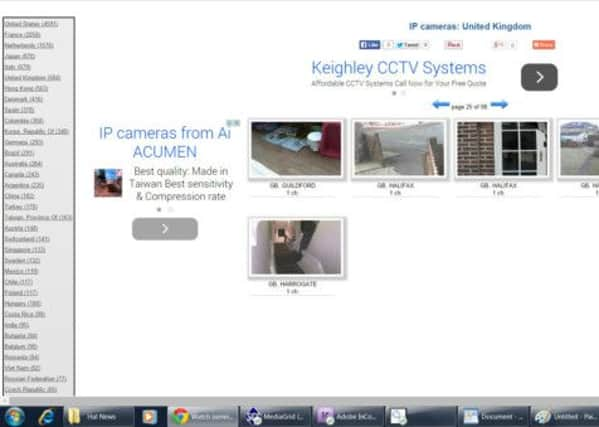Halifax homes spied on by camera hackers


Webcams in Halifax have been hacked by a Russian website broadcasting the inside and outside of thousands of peoples homes and offices across the world.
The live video feed is providing a window into the personal lives of more than 600 people across the UK.
Advertisement
Hide AdAdvertisement
Hide AdThe Halifax Courier has found that over 25 cameras are currently streaming in West Yorkshire, including in Halifax, Wakefield, Bradford, Leeds, Keighley and Huddersfield from the Russian website.
Two camera-enabled devices show the outside and entrance to two houses in Siddal, Halifax, with a postcode and the longtitude and latitude published alongside the footage.
While in Wakefield, a live feed appeared to display a sick patient in a hospital bed.
Halifax MP Linda Riordan said the website was “very sinister”.
Advertisement
Hide AdAdvertisement
Hide Ad“It is chilling to think that people doing everyday things, like chatting to friends and relatives, are being watched. I am not sure what can be done. There always seems to be people who are one step ahead of technology.
“However, changing passwords and listening to expert advice on how to prevent the snoopers would seem sensible.”
Images of children’s bedrooms and views into family living rooms and kitchens can be accessed via the Russian website.
The site gives web voyeurs information they need to hack into people’s private camera systems, plus GPS locations and postcodes.
Advertisement
Hide AdAdvertisement
Hide AdThere are 584 UK feeds on the website, showing still images stolen from private CCTV and refreshed on a regular basis, sitting alongside thousands more from systems across the world.
The website said what it does is “fully legal” and adds: “This site has been designed in order to show the importance of the security settings.
“To remove your public camera from this site and make it private the only thing you need to do is to change your camera default password.”
With an estimated 350,000 such cameras sold in the country last year, the Information Commissioner’s Office warned that those without password protection or with weak passwords could be vulnerable to hackers - in everything from CCTV to baby monitors.
Advertisement
Hide AdAdvertisement
Hide AdInformation Commissioner Christopher Graham said the Big Brother like footage in the UK was “spooky”.
“They scan the internet and track down feeds. There are 600 in the UK and that is nothing - there are 5,000 in the States. We were alerted to it by our colleagues in Australia and Canada. It’s all over the place.”
Technology experts have been quick to point out that better security on camera-enabled devices would help to tackle this growing issue.
Lee Kenny, managing director of Snowflake Media, warned people that although it may seem like a complex issue, it could be avoided “by heeding some very basic online safety”.
Advertisement
Hide AdAdvertisement
Hide Ad“Always change the default password for your computer and webcam, preferably to one with numbers, letters, special characters and a combination of upper and lower case.
“Also try and use different passwords for different sites, especially when it comes to sites who already hold personal information, such as banks. As an additional security measure, make sure your computer has up to date virus protection and has the firewall settings switched on.”
David Emm, principal security researcher at online security firm Kaspersky Lab, said: “The problem is that we think of such devices - mobile phones, webcams, etc - as our window on the world. But we don’t realise that for cybercriminals it could be their window into ours if we don’t secure our devices.
“Hacking into a device’s camera offers those with malicious intent access to our images, our most intimate moments, our identities - and the people we want most to protect, such as our children.”
Advertisement
Hide AdAdvertisement
Hide AdMr Emm offered advice to help protect against the live streaming to footage.
Start by securing the device that provides access to the Internet - your router: 1) Change the default administrator password (it is easy for an attacker to find out the standard username and password set by the manufacturer for a device). 2) Ensure that it is using WPA2 encryption. 3) Switch off SSID, so that the name of your router is not broadcast to anyone within range;
:: Change the default password for any other devices you use - baby monitors, webcams, printers;
:: Ensure your mobile devices are fully protected with security software. Cyber attacks aimed at mobile devices are increasing rapidly and it is no longer just our laptops and desktop PCs that need protecting.